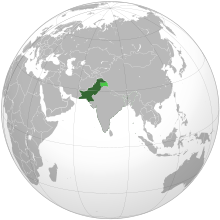Seoul Nuclear Security Summit 2012: Pakistan’s Position – Analysis
By IPCS
By J Jeganaathan
Genesis
The Seoul Nuclear Security Summit 2012 concluded on a satisfactory note that the participant states have lived up to their commitments towards strengthening nuclear security and safety and minimising the threat of nuclear terrorism which was envisioned during the first Summit of the NSS at Washington in 2010. Contrary to the Bush administration’s Proliferation Security Initiative (PSI), which aimed to halt illicit trafficking of nuclear materials to- and from- states and non-state actors, the NSS intends to build a multilateral normative nuclear security regime based on individual states’ commitment to their respective national laws and international obligation. During the 2012 Summit these states presented their progress reports in terms of what was promised earlier and what has been achieved so far.

Pakistan’s National Statement on Nuclear Security Measures spelled out by Prime Minister Yousaf Raza Gilani drew more attention than others given the curiosity amongst internal players about the kind of measures that this country notorious for its clandestine nuclear network and vulnerable for nuclear theft and misuse would have taken towards nuclear security. Hence, Pakistan’s stance on nuclear security measures warrants closer scrutiny.
Pakistan’s promises: A Progress Report card
At the Washington Summit, Pakistan had agreed to take necessary steps to implement the security measures outlined in the Work Plan to prevent nuclear terrorism. Some of the measures included nuclear forensics, intelligence sharing to combat illicit trafficking of nuclear materials, and international cooperation on fissile materials use. Pakistan also promised to ratify the amendments made to the Convention on Physical Protection of Nuclear Material (CPPNM).
Since then Pakistan has made significant progress towards nuclear security by taking necessary steps to allay the fears of possibility of nuclear terrorism. While presenting the progress report in the Nuclear Security Summit 2012, Pakistan’s PM welcomed the NSS process as a catalyst for fostering nuclear security culture and reiterated Pakistan’s commitment to the goal of enhancing nuclear security. He also illustrated the four pillars of Pakistan’s nuclear security regimen in the National Statement on security measures.
First, a ‘well-defined robust command and control system’, which exercises control over all aspects of nuclear policy, procurement, operations and nuclear security. This includes the Strategic Plans Division (SPD), which develops technical solutions, personnel reliability programme and intelligence capabilities to deal with non-proliferation, nuclear accidents and WMD terrorism.
Second, a rigorous regulatory regime which encompasses all matters related to nuclear safety and security including physical protection of materials and facilities, material control and accounting, transport security, prevention of illicit trafficking and border controls. Notably, Pakistan is a party to the Convention on Physical Protection of Nuclear Material (CPPNM).
The last two pillars are: a comprehensive export control regime and international cooperation. Whilst the export control laws are at par with international standards set by the Nuclear Suppliers Group (NSG), the Missile Technology Control Regime (MTCR) and Australia Group as claimed by Pakistan, it still has a long way to go to meet the international requirements in terms of technology transfers.
In terms of achievement on nuclear security related activities, the statement emphasises two areas: capacity building and interaction with international community. Meanwhile, as part of its capacity building measures, Pakistan has established a Training Academy which conducts specialist courses in physical protection and personnel reliability. The Pakistan Nuclear Regulatory Authority (PNRA) has also established a separate school for Nuclear Radiation Safety and in the process of setting up a Nuclear Security Training Centre (NSTC). It also renewed its Nuclear Security Action Plan (NSAP) last year, which periodically upgrades the physical security of nuclear medical centres functioning under Pakistan Atomic Energy Commission (PAEC).
On combating illicit trafficking, Pakistan is developing “Special Nuclear Material (SNM) Portals on key exit/entry points to deter detect and prevent illicit trafficking of nuclear and radioactive materials.” The PM also stated that the Strategic Export Control Division (SECDIV) revised the National Export List in July 2011. On nuclear forensics, it is reiterated in his statement that Pakistan has been actively working in the Global Initiative to Combat Nuclear Terrorism and is preparing guidelines on nuclear detection architecture.
Revelations: Parochial Altruism in nuclear security regime
Pakistan’s participation and its active involvement in the NSS was broadly welcomed and appreciated. Pakistan’s national progress statement gives an impression that its nuclear security and safety measures are so far so good. But, the most interesting and revealing aspect of the report is its future commitments which reflect its aspirations. Most stunningly, there was a statement made that Pakistan qualifies to become a member of the NSG and other export control regimes on a non-discriminatory basis.
This behaviour at the Seoul Security Summit reveals Pakistan’s parochial altruistic attitude towards nuclear security regimes – practicing altruism in the NSS and pursuing parochialism outside of it. One cannot easily forget the impact of A.Q. Khan clandestine nuclear network on global nuclear regime. It appears that the civilian government desires to pursue the altruistic goal of working towards common objective of global nuclear security, whereas the military regime in Pakistan still retains a strong control over all aspects of nuclear policy for strategic interests. In a nutshell, the progress report is quite unrealistic.
J Jeganaathan
Research Officer, IPCS
email: [email protected]
